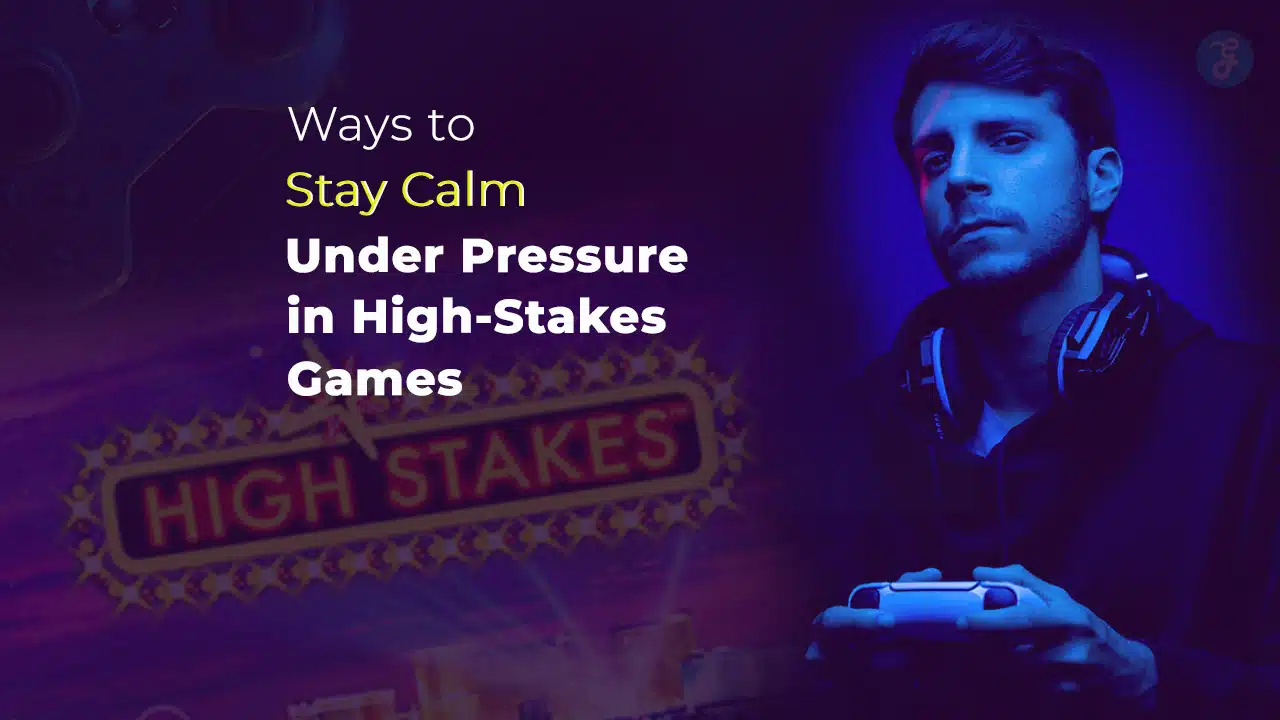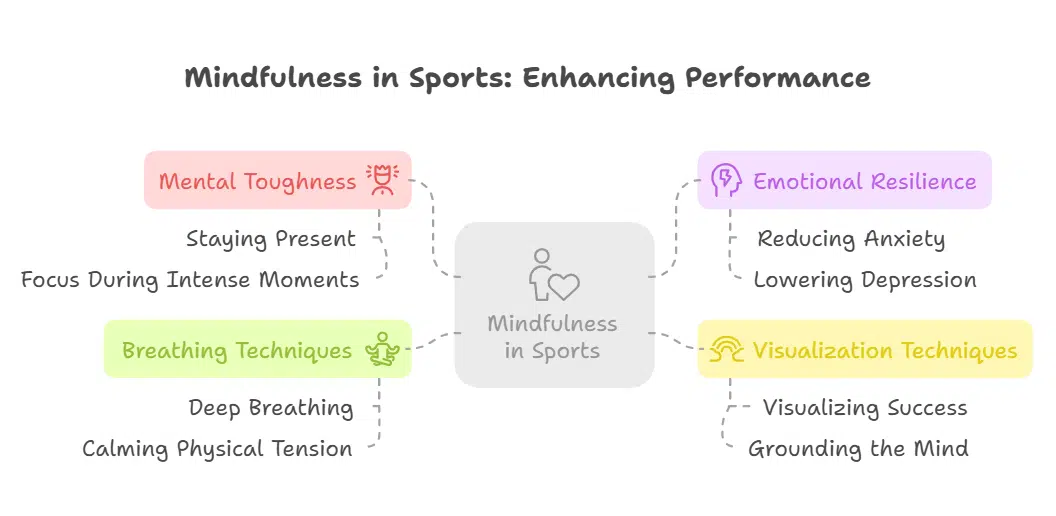Pressure can feel overwhelming in high-stakes games. Athletes face the challenge of staying calm while performing under intense expectations. The mental strain can often affect focus, decision-making, and performance as a whole.
Many professional athletes, like LeBron James and Lionel Messi, have learned to excel under pressure using specific strategies. With practice and the right mindset, anyone can develop these skills too.
This blog shares 10 practical ways to stay calm under pressure in high-stakes games. These tips will help you develop mental strength and increase your confidence when it matters most.
Keep reading for transformative advice!
Mental Preparation: Build a Strong Foundation
Building mental toughness begins well before the game. Athletes like LeBron James focus on creating habits that strengthen mental resilience. Start by using visualization techniques to imagine success.
Visualize scoring points or executing plays with precision. This creates positive mental images, boosting confidence and readiness for pressure-filled moments.
Discipline your mind through consistent inner work. Establish routines that include deep breathing techniques, affirmations, and mindfulness exercises. Controlled exhaling calms nerves and enhances focus during high-stakes situations.
Strong preparation supports better performance under stress and safeguards long-term mental health in competitive environments.
Practice Mindfulness to Stay Present
Mindfulness strengthens mental toughness in high-stakes games. It helps players stay present and focused during intense moments. Athletes like LeBron James use this practice to sharpen decision-making under pressure.
Mindfulness reduces anxiety by improving emotional resilience, allowing you to handle stress more effectively. Research shows it lowers depression and enhances focus, which can make a critical difference in football or other sports.
Use visualization techniques alongside deep breathing techniques to control emotions. Visualizing success keeps your mind grounded while steady breathing calms physical tension. Breathe deeply for four counts, then exhale slowly for six counts to relax during pressure situations.
This approach enhances mental clarity while also improving body awareness during gameplay moments that demand quick reactions.
Develop Pre-Game Routines
A solid pre-game routine can help you handle pressure and boost mental toughness. Consistency is key to calming nerves and building focus before high-stakes games.
- Start with light stretching to release tension from your body. It helps prepare muscles while keeping you relaxed.
- Set aside 10-15 minutes for visualization techniques. Picture yourself succeeding in key moments of the game and staying composed under pressure.
- Listen to music that energizes or calms you, depending on what you need most at the moment. Music can set the tone and focus your mind.
- Use positive affirmations before stepping onto the field or court. Say phrases like “I’m prepared” or “I am strong.” These words build confidence and reinforce mental resilience.
- Review your strategy or game plan briefly to remind yourself of controllable factors. Avoid overthinking but ensure readiness for action.
- Practice deep breathing techniques to steady your pulse and clear your mind before competing. Inhale slowly through your nose, hold it, then exhale deeply through your mouth.
- Reflect on past wins or successful moments in similar games to boost hope and belief in yourself.
Use Positive Self-Talk to Boost Confidence
Positive self-talk helps athletes build mental toughness and stay focused during high-pressure situations. Saying phrases like “I’ve got this” or “I am prepared for this moment” can reduce stress and boost confidence.
LeBron James, known for his incredible mental resilience, relies on affirming statements to keep his mindset strong in games.
Personalizing these self-talk phrases makes them more effective for performance. Changing negative thoughts into positive affirmations improves focus and energy under stress. Including encouraging statements in pre-game routines builds confidence over time while strengthening mental preparation.
Visualize Success Before the Game
Athletes like LeBron James use visualization techniques to prepare for intense competition. Imagining game scenarios and successful plays can help in building mental toughness and boosting confidence.
This practice reduces anxiety by making high-stakes moments feel familiar.
Visualizing victory allows players to internalize the emotions of winning. It trains the mind to focus on achieving goals under pressure. Setting aside a few minutes before games enhances concentration and improves mental resilience.
Make this practice part of your pre-game routine for sharper focus when it matters most.
Simulate High-Stakes Scenarios in Training
Simulating high-pressure scenarios in training strengthens mental toughness and prepares players for intense games. It enhances focus, confidence, and decision-making under stress.
- Use the First to Five Drill to recreate competitive conditions. This drill mirrors a live game where athletes must win five points first, fostering real-time pressure.
- Practice the Card Drill with 12 cards. Assign each card to different game situations, such as penalty shots or time-limited plays, improving adaptability during challenging moments.
- Introduce time-limited challenges. For example, players must score a specific number of points within two minutes, helping them maintain composure under strict deadlines.
- Include penalty drills regularly. These reproduce end-game scenarios where success depends on precision and calmness under stress.
- Gradually increase intensity during scrimmages. By adding timers or stakes like extra points, players learn to stay focused in high-pressure situations.
- Emphasize team communication during drills. Clear instructions and teamwork help minimize errors caused by pressure.
- Rotate roles in pivotal moments. Allow players to experience different responsibilities to build overall resilience and readiness for any challenge.
Focus on Controllable Factors
Direct your energy toward factors you can control, like effort and attitude. Fixating on outcomes or external distractions drains focus and reduces mental resilience. In high-pressure moments, athletes like LeBron James excel by staying calm and prioritizing what’s within their control—such as performance consistency or sticking to a routine.
Maintain discipline in the face of uncertainty by focusing on preparation and execution. For example, use deep breathing techniques to stay grounded instead of worrying about audience reactions or scoreboards.
Shifting attention to controllable actions enhances mental toughness and promotes peak performance under stress.
Use Breathwork to Stay Relaxed
Deep breathing techniques help control your heart rate and calm nerves during high-stakes games. Inhale deeply through your nose for four counts, hold it for two counts, then exhale slowly for another four counts.
This simple method improves oxygen flow, reduces tension, and brings fresh air into your lungs. It also prevents shallow breathing that can worsen stress.
Athletes like LeBron James use breathwork to maintain mental resilience under pressure. Deliberate breathing keeps the mind sharp and focused while promoting relaxation. Practicing this during intense moments builds mental toughness and enhances performance in critical situations.
Learn to Reframe Pressure as a Challenge
Pressure can act as a trigger for growth. Viewing high-stakes moments as challenges—rather than threats—can improve mental resilience and performance. Stress, when reframed, becomes a tool to build strength and readiness.
For example, top athletes like LeBron James often see intense games as opportunities to showcase their skills under pressure.
Negative self-talk can intensify stress levels. Replace it with constructive affirmations to stay focused and calm. Accepting that perfection is unnecessary helps ease tension during critical moments.
Treat setbacks in the game as learning experiences that drive improvement, turning failures into stepping stones for success.
Build Confidence Through Repetition
Start small by repeatedly practicing specific skills. Break down complex movements or strategies into smaller, manageable parts. For example, basketball legend LeBron James spends hours perfecting free throws and other fundamentals.
Repetition builds muscle memory and sharpens mental resilience, ensuring these actions feel automatic during high-pressure moments.
Analyze past performances to identify what worked well. Reflecting on successful outcomes helps you highlight confidence factors like technique and focus. Combine physical repetition with mental rehearsal through visualization techniques to enhance readiness further.
Accept mistakes as part of the process while celebrating progress along the way. Over time, these steps boost mental toughness under pressure in any game scenario.
Takeaways
Staying calm under pressure is a skill every athlete can master. With practice and the right strategies, you can train your mind to stay focused during high-stakes moments. Techniques like deep breathing, visualization, and positive self-talk build mental toughness over time.
Athletes such as LeBron James demonstrate how confidence grows with preparation. Apply these tools consistently to perform at your best when it counts most.
FAQs on Ways To Stay Calm Under Pressure In High-Stakes Games
1. What is mental toughness, and why is it important in high-stakes games?
Mental toughness means staying focused and confident under pressure. It helps players perform their best, even when the stakes are high or the situation feels overwhelming.
2. How can deep breathing techniques help during intense moments in a game?
Deep breathing techniques calm your mind and body. They lower stress levels, improve focus, and help you manage pressure effectively.
3. How do athletes like LeBron James handle pressure in critical situations?
LeBron James builds mental resilience by staying composed, trusting his skills, and focusing on the moment instead of worrying about outcomes.
4. What steps can I take to build better mental resilience for tough games?
Practice handling pressure through regular training, use deep breathing techniques to stay calm, and develop confidence by preparing thoroughly before each game.









































